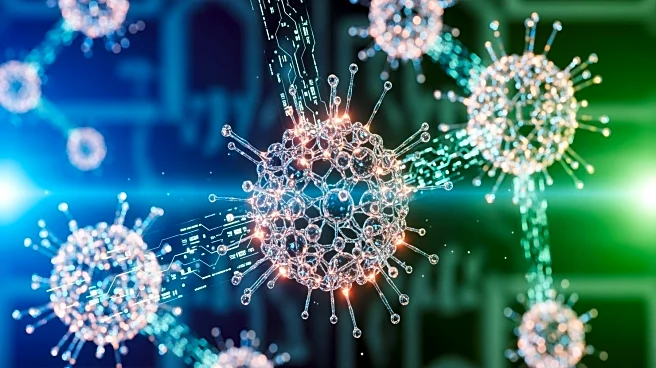What's Happening?
The global market for lipid nanoparticles (LNPs) reached $786 million in 2024 and is projected to grow at an annual rate of 14% until 2030. This growth is largely attributed to the success of LNP-based
mRNA vaccines for COVID-19, which have spurred increased development of LNP technology. LNPs are now in demand for use in drugs targeting cancer, cardiovascular disease, and other chronic conditions. They offer advantages such as improved targeting ability, drug-loading efficiency, and stability. However, characterizing LNPs early in development remains challenging due to their inherent heterogeneity. Analytical ultracentrifugation (AUC), a technology invented nearly 100 years ago, is emerging as a solution for high-resolution characterization of LNPs, providing precise data on size, heterogeneity, and other critical attributes.
Why It's Important?
The expansion of the LNP market signifies a pivotal shift in drug delivery methods, potentially revolutionizing treatments for various diseases. The success of mRNA vaccines has highlighted the efficacy of LNPs, encouraging their application in other therapeutic areas. This growth could lead to more efficient and targeted drug delivery systems, improving patient outcomes and reducing side effects. The adoption of AUC for LNP characterization may enhance the development process, ensuring higher quality and safer formulations. As LNP technology advances, it could play a crucial role in the future of personalized medicine and gene therapy, impacting both the pharmaceutical industry and healthcare practices.
What's Next?
The continued development of LNP technology is expected to drive further innovations in drug delivery systems. Cross-disciplinary collaboration will be essential to simplify complex workflows and enhance efficiency. Advances in automation and analytical techniques, such as AUC, will be key to accelerating development and bringing novel therapies to market faster. The integration of LNPs in CRISPR-based gene editing therapies is a promising area of research, potentially leading to breakthroughs in personalized genetic treatments. As the field evolves, stakeholders in the pharmaceutical industry and healthcare sectors will need to adapt to these changes, potentially reshaping drug development and delivery strategies.
Beyond the Headlines
The rise of LNP technology raises ethical and regulatory considerations, particularly in the context of gene editing and personalized medicine. Ensuring the safety and efficacy of LNP-based therapies will require rigorous testing and compliance with regulatory standards. The potential for LNPs to enable precise gene editing also poses questions about the ethical implications of genetic modifications. As these technologies advance, ongoing dialogue among scientists, policymakers, and the public will be crucial to address these concerns and guide responsible innovation.









